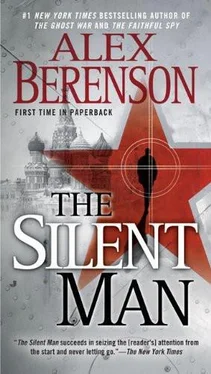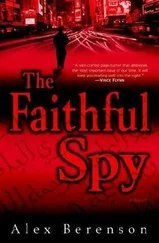Alex Berenson - The Silent Man
Здесь есть возможность читать онлайн «Alex Berenson - The Silent Man» весь текст электронной книги совершенно бесплатно (целиком полную версию без сокращений). В некоторых случаях можно слушать аудио, скачать через торрент в формате fb2 и присутствует краткое содержание. Жанр: Шпионский детектив, на английском языке. Описание произведения, (предисловие) а так же отзывы посетителей доступны на портале библиотеки ЛибКат.
- Название:The Silent Man
- Автор:
- Жанр:
- Год:неизвестен
- ISBN:нет данных
- Рейтинг книги:5 / 5. Голосов: 1
-
Избранное:Добавить в избранное
- Отзывы:
-
Ваша оценка:
- 100
- 1
- 2
- 3
- 4
- 5
The Silent Man: краткое содержание, описание и аннотация
Предлагаем к чтению аннотацию, описание, краткое содержание или предисловие (зависит от того, что написал сам автор книги «The Silent Man»). Если вы не нашли необходимую информацию о книге — напишите в комментариях, мы постараемся отыскать её.
The Silent Man — читать онлайн бесплатно полную книгу (весь текст) целиком
Ниже представлен текст книги, разбитый по страницам. Система сохранения места последней прочитанной страницы, позволяет с удобством читать онлайн бесплатно книгу «The Silent Man», без необходимости каждый раз заново искать на чём Вы остановились. Поставьте закладку, и сможете в любой момент перейти на страницу, на которой закончили чтение.
Интервал:
Закладка:
“And this was when?”
“January 10 or 11. More than two weeks ago.”
“So where exactly did the drop happen?”
“No one on the crew can tell us.”
“How is that possible?”
“The navy says these freighters, they’re not democracies. Officers’ orders aren’t questioned. Ever. And this time, only the captain and the first mate knew exactly where they were. And the first mate went overboard when they were bringing the crates in. Maybe intentional, maybe an accident. That leaves the captain. Haxhi is his name. Albanian. And he’s not talking, not yet. But we’re guessing it must have been Nova Scotia. Highways from there lead straight to the U.S. border. The Canadians are checking their naval records for suspicious contacts. But they haven’t found anything, and considering this was a couple weeks ago, they probably won’t.”
“They still have to get it over the border.”
“Unless they have a hard-on for Montreal, yeah. We’re figuring they drove. Why go to so much trouble, sailing these crates across the Atlantic, and then try to airmail them from Canada? Plus the crates, whatever’s in them, FedEx or DHL would notice. So they drove. Probable entry points are Maine and New York. We’ve checked the border records, looking for pairs of Arab guys. We even checked immigration records for Arab men who flew in from Canada on passports from Middle Eastern countries or Europe. And we’ve found a couple of hundred since January 1. We’re trying to track them down. But there’s nobody who pops out. Nobody who crosses with the Gray Book or the Black Book. No surprise. They would have been flagged and arrested at the border. So whoever these guys are, they probably have American or Canadian passports.”
“We checking those?”
“Close to fifty thousand people fly between the United States and Canada every day. A four-day window, that’s two hundred thousand people. Even if we just go for the obvious Arab names, cut out everyone else, we’re stuck with maybe five thousand to check. And we’re three weeks late, which means bad forwarding addresses, or no addresses at all, for ninety percent of them. It’s impossible.”
Wells digested this bad news in silence. Four crates. Carrying uranium, bombs, who knew what? Now, most likely, on American soil.
“Still there, John? It gets worse. The crew of the Juno says that Haxhi, the captain, after the Decatur showed up, but before it boarded the Juno , he made a call on his sat phone. Then he tossed the phone. Probably he and Bernard were running a traffic light, an indirect. A preset alarm.”
“I get it, Ellis.” The goal was to eliminate direct links between the Juno and Bernard but still have a way to let Bernard know if the Juno ran into trouble. The solution was a cut-out voice mail, one that Haxhi would call only if he believed he was in serious trouble. Bernard would check the voice mail every day. As long as it was empty, he’d know that Haxhi was safe. The light was green. But if Haxhi thought the Juno was going to be boarded, he’d leave a message, a yellow signal. If he didn’t call back with an all-clear within twenty-four to forty-eight hours, the signal went red. Bernard would assume that Haxhi had been taken down — and that he was next on the list.
“When did the Decatur find the Juno ?”
“Yesterday afternoon.”
“Makes sense,” Wells said. “Bernard checks the voice mail, gets the message, burns his stuff, takes off. I’m useless here now, Ellis. Bernard probably thinks I’m with the BND. Even if he doesn’t, he’s not going to look to me for help. The Germans should move in, take him down. Assuming they know where he is. I’ll catch the next flight to Washington.”
“You going commercial or you want an Air Force ride?”
“Whatever’s quicker. Probably commercial.”
“Sure you wouldn’t rather stay in Hamburg? It’s outside the blast radius.” Click.
WELLS CHECKED THE FLIGHTS. Continental had an evening nonstop from Hamburg to Newark, getting in around 10 p.m. Eastern. From there he could grab the last connection of the night to Reagan. He still had a couple of hours, plenty of time to make the flight. He made the reservation and began to pack. But just as he finished and zipped up, his second phone, Roland Albert’s phone, rang.
Roland’s phone? Only Bernard had that number. The caller identification showed a local Hamburg exchange. “Roland here.”
“I need to see you.” The voice was Bernard’s. “Now.”
29
The bomb was ungainly-looking, a sphere of steel with the long barrel of the Spear recoilless rifle sticking from its side. More than ungainly. Ugly. It looked like an oversized, broken barbell, like a bowling ball attached to a stovepipe. It looked like an Introduction to Sculpture 101 project produced by a particularly dismal student. It looked like anything but what it was, Bashir thought.
Bashir had the stable to himself this morning, after two long days of working beside Nasiji and Yusuf, forging the steel tamper and welding the barrel of the Spear to the hole that tunneled into its heart.
“You don’t know the trouble you’re about to cause,” Bashir said to the bomb. Even now, he couldn’t believe that this jerry-rigged heap of metal could have anything like the destructive power that Nasiji expected. Bashir stared at the bomb. “Don’t you have any manners, Mr. Gadget? You must know ignoring me isn’t polite. Especially since I’m the one who made you. And it was tiring work.”
Indeed, Bashir had hardly slept the last few days. He hadn’t been so exhausted since his first year as a surgical resident, when he’d caught himself more than once in the middle of rounds leaning against a wall and trying to sleep standing up. Bashir took another look at his handiwork, trying to decide if he was proud or ashamed. The steel ball was solid and strong, its seams invisible.
Bashir and Nasiji and Yusuf had tested the design three days before, using steel in place of the uranium that would be at the center of the live bomb. For the test, they loaded the outer half of the dummy steel pit and the 73-millimeter explosive round into the breech of the barrel. Then they covered the Spear and the tamper with heavy wool blankets to dull the noise from the blast. To be safe, they’d already moved all their equipment — and, of course, the partially disassembled Iskander warhead — out of the stable.
The Spear was fired by a trigger inside a pistol grip attached to its barrel. They would blow the real bomb simply by pulling the trigger. No point in trying to set it off from a distance. When it went, so would they. But for this practice firing Bashir soldered the tip of a flexible spool of thin steel wire to the trigger. Then Yusuf cut a hole in the wall of the stable and ran the spool through it.
Outside, Bashir walked through the woods, unspooling the wire until the slack was gone. He stood behind a tree, shivering, pulling lightly on the wire. The steel felt almost alive under his gloved fingertips, tensing and loosening as if a fish were hooked on the end of the line. Dusk had fallen and night was coming quickly, the weak winter sun disappearing into the hills behind them.
“Ready?” Bashir said.
Nasiji reached for the wire. Bashir wanted to pull the trigger himself. He was the one who’d forged the tamper, after all. But without a word he handed it over. Nasiji held the wire, closed his eyes — he might have been praying — gave the wire a sturdy tug—
And boom !
The explosion echoed through the woods, sending squirrels chittering angrily from the trees around them. A bird, big and black and fast, some kind of crow, took off from a stand of pines and flew straight at Bashir before turning up into the night. The stable shook, and though it held, a piece of the wall disappeared, sending shingles in their direction.
Читать дальшеИнтервал:
Закладка:
Похожие книги на «The Silent Man»
Представляем Вашему вниманию похожие книги на «The Silent Man» списком для выбора. Мы отобрали схожую по названию и смыслу литературу в надежде предоставить читателям больше вариантов отыскать новые, интересные, ещё непрочитанные произведения.
Обсуждение, отзывы о книге «The Silent Man» и просто собственные мнения читателей. Оставьте ваши комментарии, напишите, что Вы думаете о произведении, его смысле или главных героях. Укажите что конкретно понравилось, а что нет, и почему Вы так считаете.












